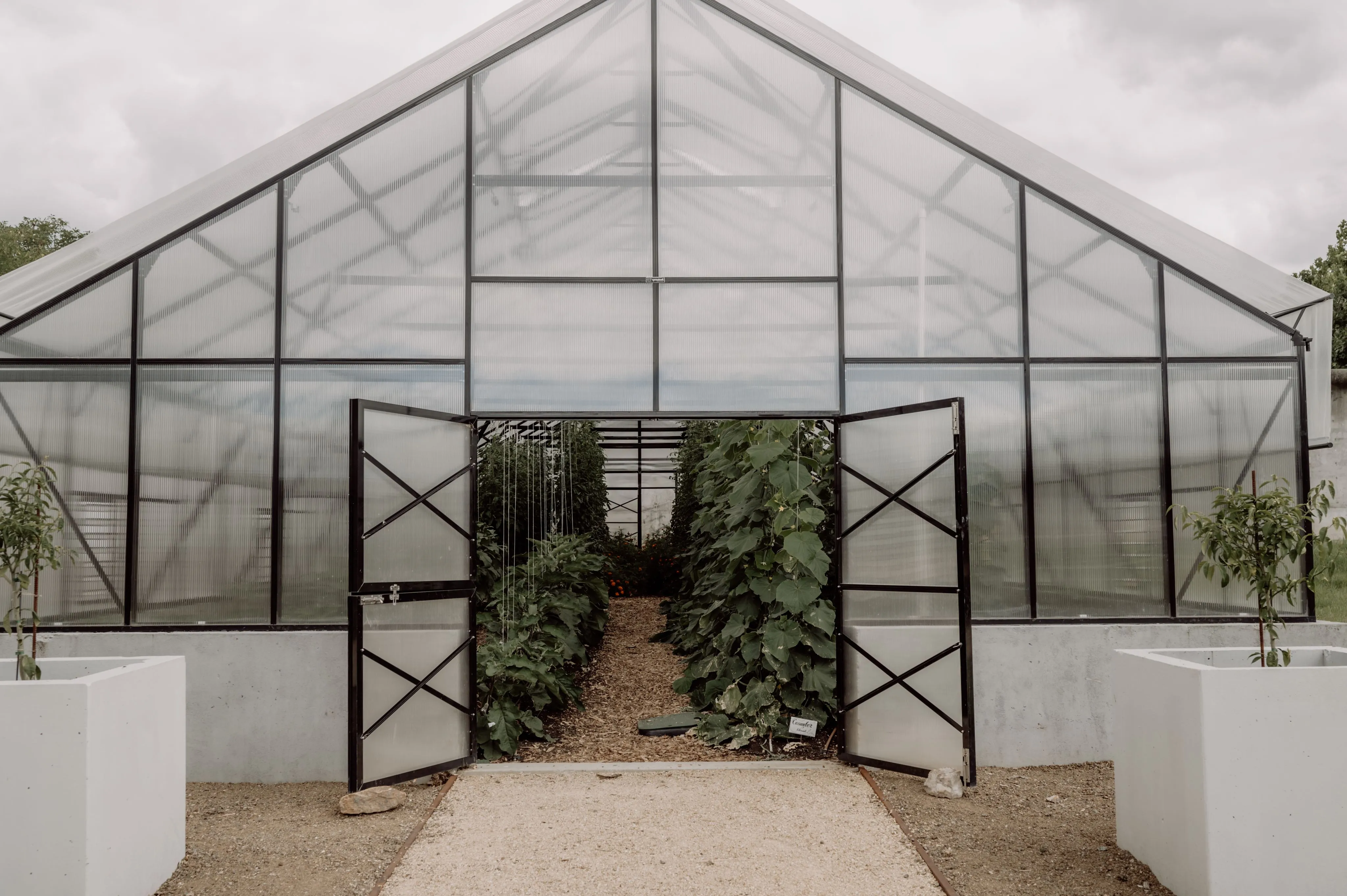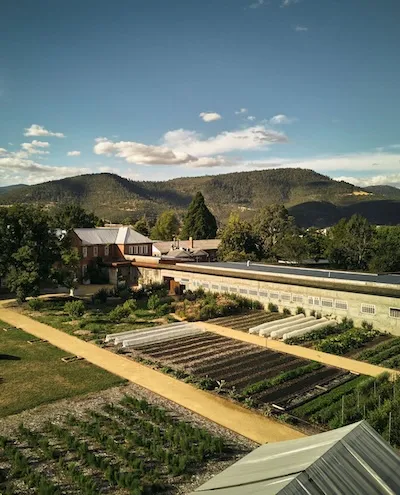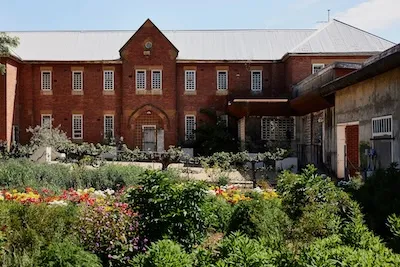Nestled in the heart of Tasmania, Australia, The Agrarian Kitchen is a beacon of culinary excellence and sustainable farming. Founded by Rodney Dunn and Severine Demanet, their team is motivated by a profound respect for high-quality, locally-sourced ingredients. Their journey began with a simple idea: to reconnect people with their food.
This vision has grown to include a celebrated cooking school, an award-winning restaurant, and an outdoor kiosk, all centered around a vibrant farm designed by Head Gardener Mitch Thiessen. The farm includes a market garden, berry patch, greenhouse, shade house, nursery, orchard, citrus grove, composting station, and ornamental areas.

Photo credit: Anna Critchley

Photo credit: Luke Burgess

Photo credit: Sam Shelly
Quality Driven by Local Ingredients
The moment produce is harvested, it begins to lose its quality and nutrient density, making locally sourced ingredients crucial for maintaining quality. At The Agrarian Kitchen, this principle is at the core of every dish. Vibrant and dictated by what the farm provides, each meal served reflects their commitment to seasonality and flavor.
"I always say you could be the best chef in the world, but you're only as good as your ingredients," Rodney said.
Every ingredient is sourced locally, whether it's grown on their farm; harvested from the community garden across the road; or sourced from a network of local producers, farmers, and fishermen. With such high-quality ingredients, their approach is straightforward: let the natural flavors take center stage.
"If you look at the food we cook, it's quite simple, and over time, it's gotten simpler because the ingredients have gotten better," Rodney explained. "You're able to let those things shine rather than have to impose yourself on them."
An Easier Way to Leverage Data
Quality in the kitchen starts with excellence on the farm, and The Agrarian Kitchen leverages Tend to maintain this standard. Their diverse and adaptive farming practices integrate biodynamic, permaculture, regenerative, and circular methods—like producing their own compost from kitchen waste—to enhance soil health and crop quality.
Continuous data collection, including soil testing and measuring brix, pairs with feedback from their chefs on flavor and freshness to inform their cultivation methods. Capturing all this information alongside Tend's yield and harvest reports enables The Agrarian Kitchen to refine their growing practices year after year.
"With a lot of our data collection, it's about finding trends over many years," Mitch said. "Having that all organized in one space so we don't have to have different spreadsheets over different years is incredibly useful."
With centralized analytics in Tend, The Agrarian Kitchen can easily identify actionable insights, linking their cultivation methods directly to yields and quality. This connection enables them to quantify areas for improvement and make data-driven decisions for their business.
Maximizing a Small Growing Space: Why Tend Works Better than Spreadsheets
The Agrarian Kitchen is now flourishing in their second location, with their farm sitting on just over 0.5 hectares (5000 square meters). Transitioning from their original 2.5-hectares farm, they faced the challenge of optimizing a smaller growing area. Strategic planning was essential to optimize yield and functionality, particularly given the constraints of their new location—it's set within the walled-in exercise yard of a former mental health asylum.
Using Tend, Mitch was able to ensure every square meter was used effectively to support their diverse farm-to-table offerings. They now grow around 100 different crops in this space.
"The crop planning space of Tend is quite amazing, especially coming from the world of spreadsheets and doing my own bits and pieces," Mitch said. "I really like how it's visualized and how you can look at it in different sorts of ways, whether it's from crop type or crop location."
The growing cycle at The Agrarian Kitchen begins in their on-site nursery, where a diverse array of hybrid and heirloom varieties are carefully cultivated. The berry patch, honoring the local tradition of berry cultivation, features an assortment of raspberries, brambles, grapes, and currants. Utilizing the garden's heat-retaining walls, they cultivate a variety of Japanese citrus, and their orchard is populated with peaches and nectarines. Throughout the property, native food-producing and ornamental plants are strategically placed to meet both ecological and cultural needs.
Farm to Table, Tend Ensures Seamless Operations Across Enterprises
Tend simplifies task management across enterprises, ensuring that everyone from gardeners to kitchen staff is aligned. Tasks are easily assigned to gardeners and accessible on any mobile device right from the field, keeping operations smooth and efficient.
"They can be independent in that space because they can just click on [their tasks] and get on with it. There's no papers flying everywhere or illegible handwriting going on," Mitch explained.
The chefs are also able to quickly see what will be ready for harvest soon for easy menu planning as well as double-check the varieties of any crops. Plus, staff can provide detailed information on every crop during farm tours, such as when things were planted—something Rodney said they are always asked.
"Just having it all in one place that's accessible by lots of different people, that's updated, whether you're on your phone or your computer, I think that's one of the biggest perks."
- Mitch Thiessen, Head Gardener
Results and Impact
The Agrarian Kitchen's experience highlights Tend's ability to enhance farm management, data collection, and operational efficiency:
Efficiency Boost:
- Task Management: Streamlined daily operations, significantly reducing time spent on manual scheduling and planning.
- Data Accessibility: Improved accessibility of real-time data for all team members, enhancing responsiveness and decision-making.
Data-Driven Decisions:
- Soil Health Monitoring: Utilized Tend's detailed analytics to optimize soil treatment plans, resulting in improved soil health and increased crop yields.
- Resource Allocation: Enhanced efficiency in resource allocation, ensuring optimal use of water, nutrients, and labor.
Community Engagement:
- Educational Outreach: Expanded community engagement through more effective scheduling and management of farm tours and educational programs.
- Local Network Strengthening: Fostered stronger relationships with local producers and consumers by showcasing sustainable practices and sharing data insights.
Competitive Edge:
- Market Adaptability: Increased the farm's adaptability to market changes through better forecasting and crop rotation planning.
- Sustainability Leadership: Established The Agrarian Kitchen as a leader in sustainable farming practices within the community.
Future Outlook: Building on Success
With the enhanced efficiency and sustainability brought about by using Tend, The Agrarian Kitchen is poised to deepen their impact and expand their educational and technological initiatives. They plan to:
- Increase Crop Diversity: Continue to diversify the crops they grow, exploring new varieties that can thrive in changing climate conditions.
- Strengthen Community Connections: Develop direct-to-consumer sales platforms to improve access to fresh, local produce, enhancing community ties and supporting the local food economy.
- Expand Educational Outreach: Broaden the range and depth of educational programs, including workshops and school collaborations, to educate more people about sustainable practices.
- Enhance Culinary Experiences: Use their unique farm-to-table setup to promote culinary tourism, attracting visitors to experience Tasmania's rich culinary heritage and the connection between sustainable farming and culinary excellence firsthand.







"Data is really key. We're always really interested in how our practices influence the quality of the crops."
- Mitch Thiessen, Head Gardener